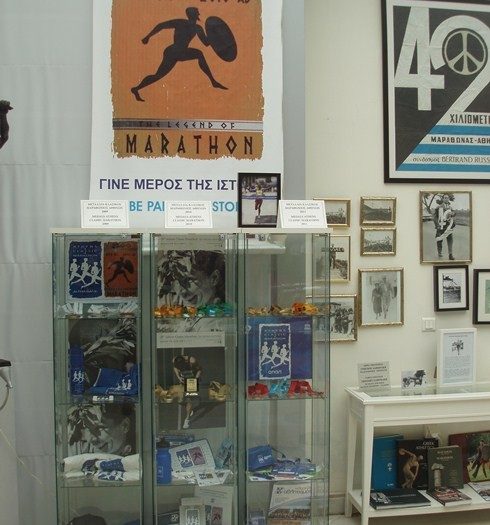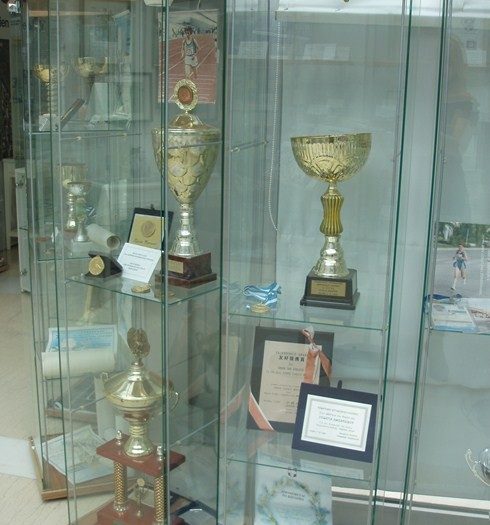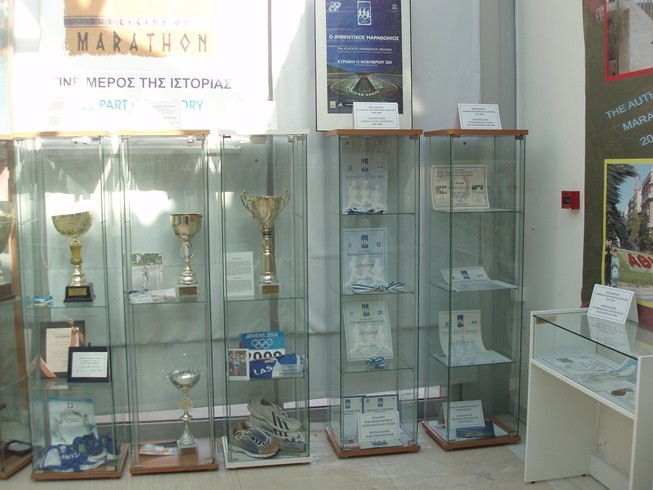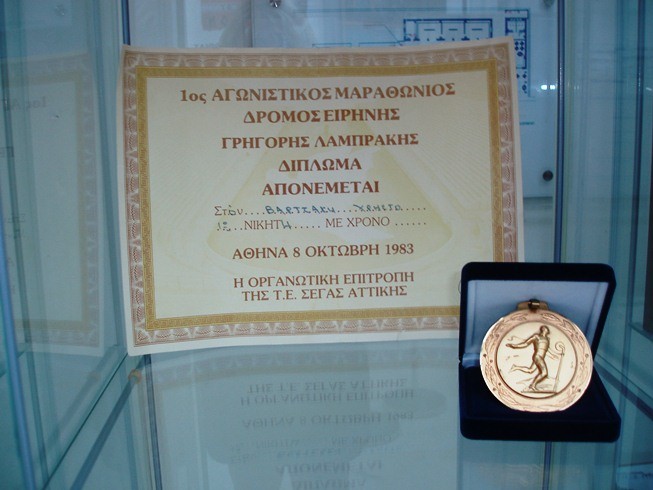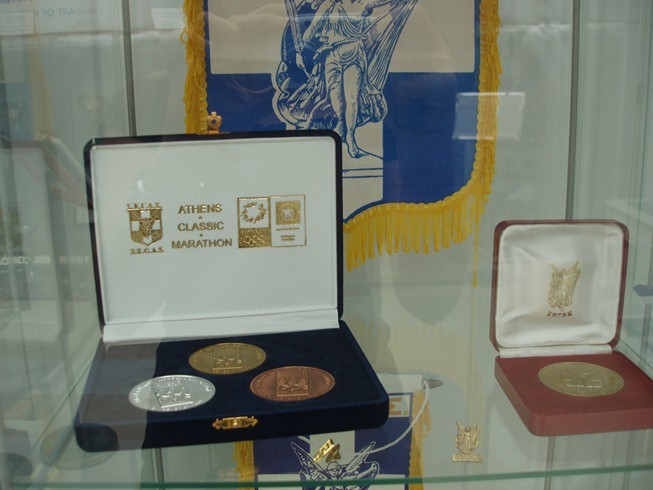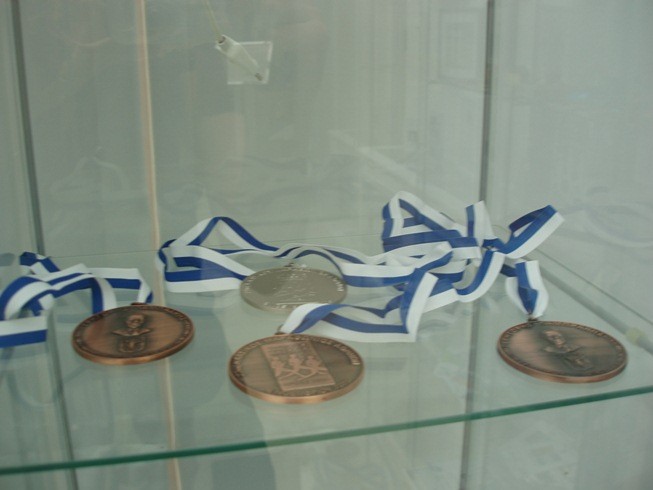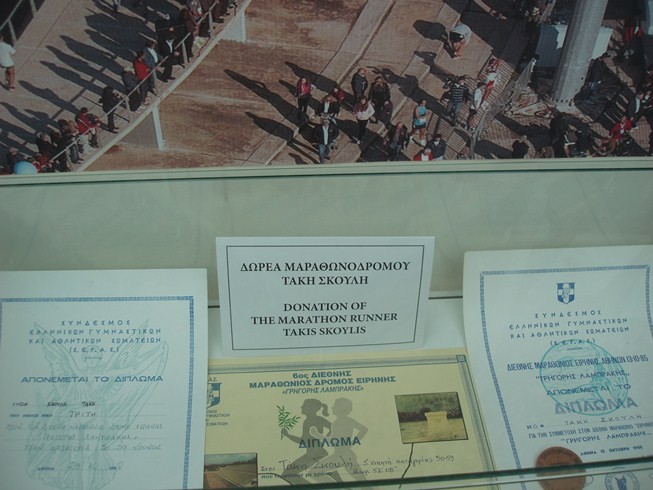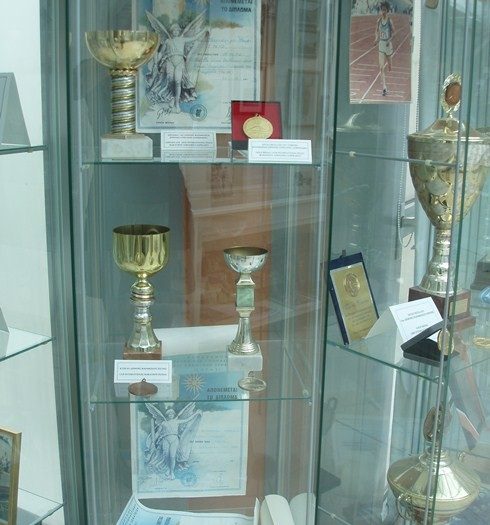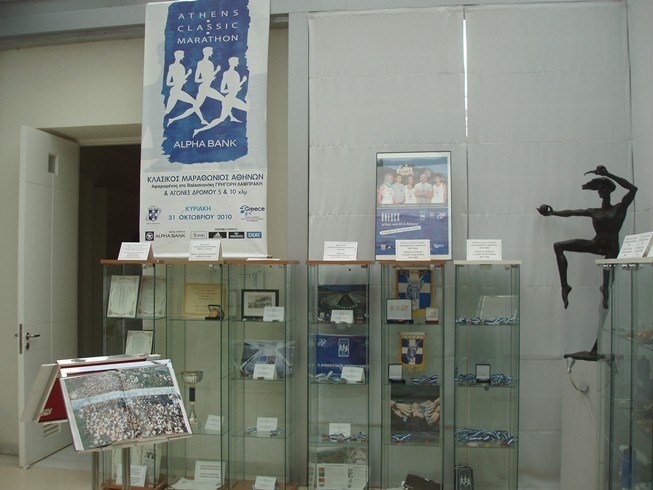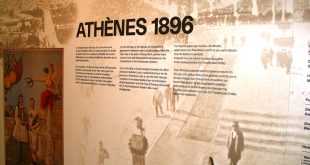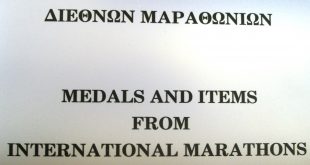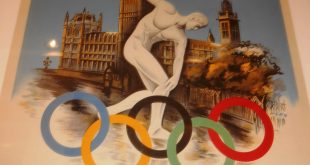the documents of Segas association’s decisions for the restoration of marathon race, in 1983, with the name Marathon Race of Peace “Grigoris Labrakis”
the authentic medals of the first Marathon Race of Peace untill today.
the diplomas that have been awarded to the winners and all the participants so far.
the first posters, momentos and athletic material.
published articles of each time
handwritten views of the protagonists.
photo tribute from the life and action of Grigoris Labrakis
Athens Classic Marathon
The Athens Classic Marathon is an annual marathon road race held in Athens, Greece, normally in early November. The race usually attracts around 5000 competitors every year, although the total reaches around 8000 when including the concurrent 5 and 10 kilometres road races and the race walking contest.
The marathon course is based on the myth from which the race gained its name: Pheidippides, a messenger in Ancient Greece, ran from the Battle of Marathon to Athens to announce the Greeks’ victory over the Persians. The provenance of the competitive race is traced back to the Marathon race at the 1896 Olympics. The Athens Classic Marathon began in 1972 as a joint venture between the Greek tourist board and athletics association. The race came under the auspices of the current organisers and SEGAS in 1983 and has since become a major race, being awarded Gold Label Road Race status by the IAAF.
It is perhaps one of the most difficult major marathon races: the course is uphill from the 10 km mark to the 31 km mark – the toughest uphill climb of any major marathon. The course begins in the town of Marathon, where it passes the tomb of the Athenian soldiers, and it traces a path near the coast through Nea Makri. Following the steep rise, the course goes lightly downhill towards the city of Athens. It passes a statue of a runner (ΟΔρομέας) in the city centre before finishing up at the Panathinaiko Stadium; a site for athletics competitions in ancient times and the finishing point for both the 1896 and 2004 Olympic marathons.
In 1982, the organisers dedicated the race to Grigoris Lambrakis, an athlete and Member of the Greek Parliament, whose murder in the 1960s has become an inspirational cause for advocates of human rights. Since 2007 the Association of International Marathons and Distance Races has organised an annual International Marathon Symposium in Marathon town the day prior to the race. Taking from the tradition of the Olympic Torch, the race features the Marathon Flame, which is lit at the Tomb of the Battle of Marathon and carried to the stadium in Marathon before the beginning of each race. The 2010 edition of the event was combined with the celebration of the 2500th anniversary of the Battle of Marathon.
Greek competitors have traditionally been strong in the men’s and women’s competitions. However, East Africans and Japanese runners have increasingly become the dominant runners from 1999 onwards. Since 1990, the Athens Classic Marathon has often served as the Greek national championships for the marathon event. The current course records are 2:11:35 hours for men, set by Raymond Bett in 2012, while Rasa Drazdauskaitė’s run of 2:31:06 in 2010 is the quickest by a woman on the course.
| Year | Men’s winner | Time (h:m:s) |
Women’s winner | Time (h:m:s) |
|---|---|---|---|---|
| 2015 | 2:21:22 | 2:52:06 | ||
| 2014 | 2:10:37 | 2:41:06 | ||
| 2013 | 2:13:51 | 2:41:32 | ||
| 2012 | 2:11:35 | 2:40:00 | ||
| 2011 | 2:11:40 | 2:35:25 | ||
| 2010 | 2:12:40 | 2:31:06 | ||
| 2009 | 2:13:44 | 2:39:56 | ||
| 2008 | 2:12:42 | 2:36:58 | ||
| 2007 | 2:14:40 | 2:33:19 | ||
| 2006 | 2:17:46 | 2:40:45 | ||
| 2005 | 2:16:15 | 2:38:39 | ||
| 2004 | 2:15:28 | 2:41:11 | ||
| 2003 | 2:16:59 | 2:43:18 | ||
| 2002 | 2:18:20 | 2:37:29 | ||
| 2001 | 2:19:26 | 2:36:15 | ||
| 2000 | 2:20:50 | 2:53:00 | ||
| 1999 | 2:18:35 | 2:46:46 | ||
| 1998 | 2:18:38 | 2:50:52 | ||
| 1997 | 2:31:47 | 2:54:43 | ||
| 1996 | 2:33:15 | 2:56:42 | ||
| 1995 | 2:27:27 | 2:59:45 | ||
| 1994 | 2:27:27 | 3:21:32 | ||
| 1993 | 2:28:12 | 3:15:56 | ||
| 1992 | 2:31:15 | 3:05:24 | ||
| 1991 | 2:28:18 | 2:59:29 | ||
| 1990 | 2:26:33 | 2:59:15 | ||
| 1989 | 2:23:19 | 2:37:42 | ||
| 1988 | 2:17:33 | 2:50:59 | ||
| 1987 | 2:25:14 | 2:43:37 | ||
| 1986 | 2:27:22 | 3:06:58 | ||
| 1985 | 2:26:20 | 3:04:30 | ||
| 1984 | 2:28:53 | 2:58:30 | ||
| 1983 | 2:25:34 | 3:20:33 | ||
| 1982 | 2:27:29 | 3:07:41 | ||
| 1981 | 2:32:50 | 3:16:00 | ||
| 1980 | 2:34:32 | 3:17:07 | ||
| 1979 | 2:31:21 | 3:34:21 | ||
| 1978 | 2:27:22 | 4:47:00 | ||
| 1977 | 2:14:40.8 | 3:05:53 | ||
| 1976 | 2:33:50 | 3:35:45 | ||
| 1975 | 2:35:39 | 3:16:13 | ||
| 1974 | 2:29:31 | 3:55:56 | ||
| 1973 | 2:32:26 | No women’s race | ||
| 1972 | 2:26:26 | No women’s race |
 Marathon Run Museum Marathon, Grèce
Marathon Run Museum Marathon, Grèce

